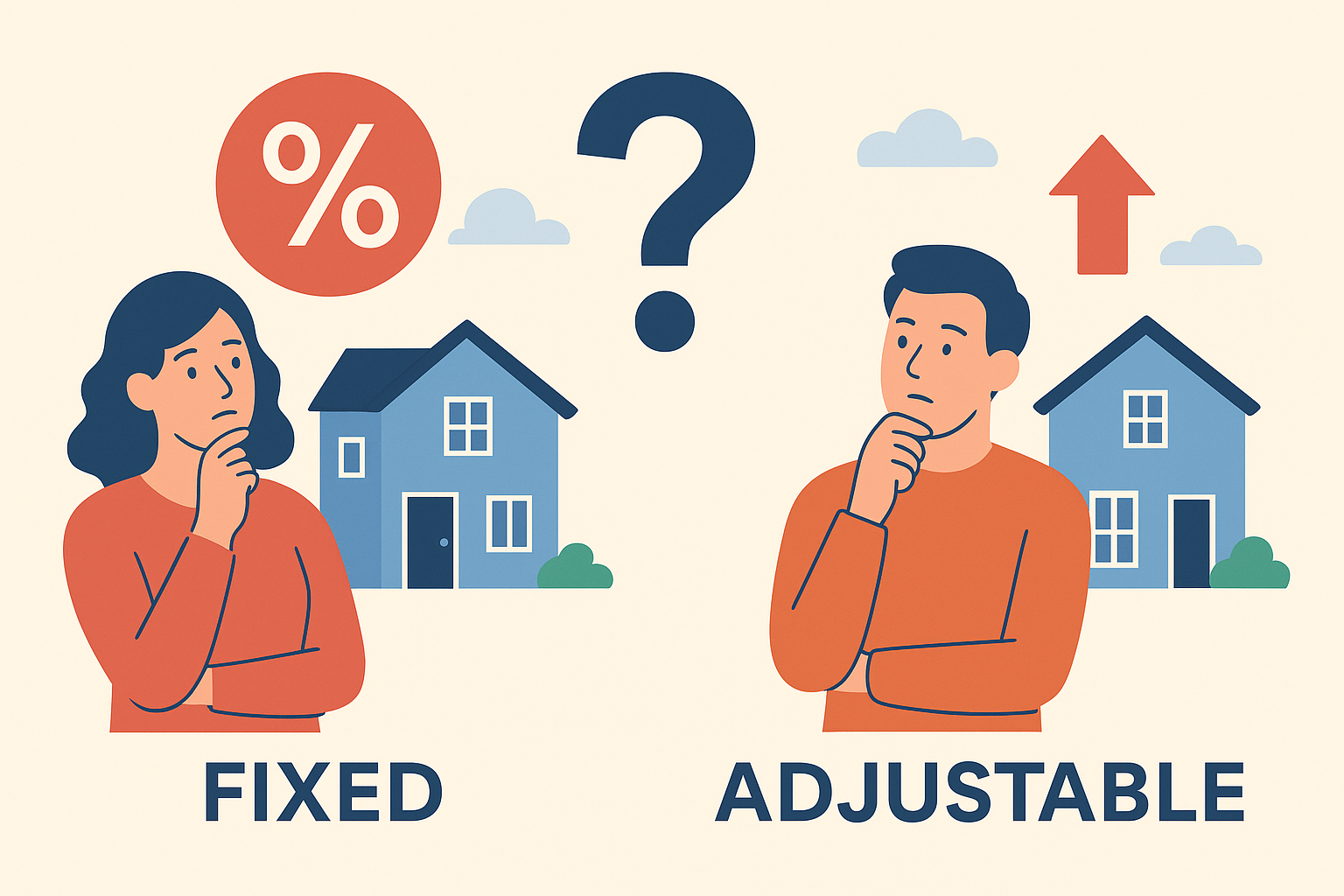Should You Go Fixed or Adjustable for Your Refinance?
November 17, 2025

Refinancing your mortgage can be a smart way to save money, reduce monthly payments, or even pay off your home faster. One of the biggest decisions homeowners face is choosing between a fixed-rate mortgage and an adjustable-rate mortgage (ARM). Each option has its pros, cons, and ideal situations depending on your financial goals, lifestyle, and how long you plan to stay in your home.
In this guide, we’ll break down everything you need to know about fixed and adjustable-rate refinancing, including benefits, drawbacks, and key considerations to help you make the smartest choice.
What Is a Fixed-Rate Mortgage Refinance?
A fixed-rate refinance locks in a single interest rate for the life of the loan, keeping your monthly payments consistent. This predictability is one reason many homeowners prefer fixed-rate mortgages when refinancing. For a closer look at your available options, you can review home refinance options to see current rates and loan structures.
Why Fixed-Rate Refinancing Works Well
Predictable payments: Your monthly principal and interest stay the same.
Long-term savings: If you plan to stay in your home for many years, locking in a rate can be financially smart.
Protection from rate hikes: During periods of rising interest rates, a fixed-rate mortgage shields you from sudden increases.
What Is an Adjustable-Rate Mortgage (ARM) Refinance?
An adjustable-rate mortgage refinance usually starts with a lower interest rate for a set period, such as 5, 7, or 10 years. After that initial phase, the rate adjusts periodically based on market conditions, which can increase or decrease your monthly payment.
Benefits of Choosing an ARM
Lower initial payments: Ideal for homeowners who want immediate savings.
Potential savings if rates stay low: If market rates remain stable, you could pay less over time.
Flexibility: Perfect for homeowners planning to sell or move within a few years.
For homeowners unsure whether an ARM is right for them, the guide Is Now the Right Time to Refinance Your Home? offers a helpful overview of timing considerations.
When Should You Consider a Fixed-Rate Mortgage?
A fixed-rate refinance is typically the best choice if you plan to stay in your home long-term, value consistency in monthly payments, or want protection against rising interest rates. Many homeowners find that reviewing home refinance options at JNA helps them determine which fixed-rate loan is the best fit for their situation.
When Is an ARM the Right Choice?
An ARM refinance may be ideal if:
You plan to sell or refinance again within a few years.
You anticipate interest rates will remain stable or drop.
You want lower initial payments to improve cash flow.
If you’re unsure about timing, consulting resources like Is Now the Right Time to Refinance Your Home? can help you make a more informed decision.
How to Decide Between Fixed and Adjustable Rates
Let’s break it down further.
Criteria | Fixed Rate | Adjustable Rate (ARM) |
|---|---|---|
Interest Rate | Higher initially | Lower initially |
Payment Stability | Constant | Fluctuates after initial period |
Best for | Long-term homeowners | Short-term homeowners or those expecting lower future rates |
Risk Level | Low | Medium to High |
Other Important Factors When Refinancing
Loan Term
Shorter loan terms, like 15 years, often come with lower rates but higher monthly payments.
Closing Costs
Refinancing typically involves closing costs ranging from 2% to 5% of your loan amount.
Credit Score
A strong credit score helps secure better refinance terms, whether you choose a fixed or adjustable mortgage.
Pre-Approval vs Pre-Qualification: Know the Difference
Before refinancing, it’s important to know the difference between pre-approval and pre-qualification. Many homeowners mix up these two steps, which can impact your refinancing process. A helpful resource on this topic is Pre-Approval vs Pre-Qualification Explained, which clarifies both concepts.
Questions to Ask Before Refinancing
Consider these questions to guide your decision:
How long do I plan to stay in my current home?
Do I expect my income to change soon?
Am I comfortable with potential interest rate increases?
Do I need stability in my monthly payments?
Answering these honestly will help you determine whether a fixed-rate or ARM refinance is the better option.
Conclusion: Choose What Matches Your Goals
Refinancing isn’t just about lowering your interest rate—it’s about choosing a mortgage that aligns with your financial future.
If stability and predictability are your priorities, a fixed-rate refinance is likely the better choice.
If you want short-term savings and can tolerate some risk, an ARM could offer significant benefits.
Carefully comparing terms and consulting a licensed mortgage advisor ensures that your refinancing strategy aligns with your life and financial goals. Done right, refinancing can be a powerful step toward long-term financial stability.